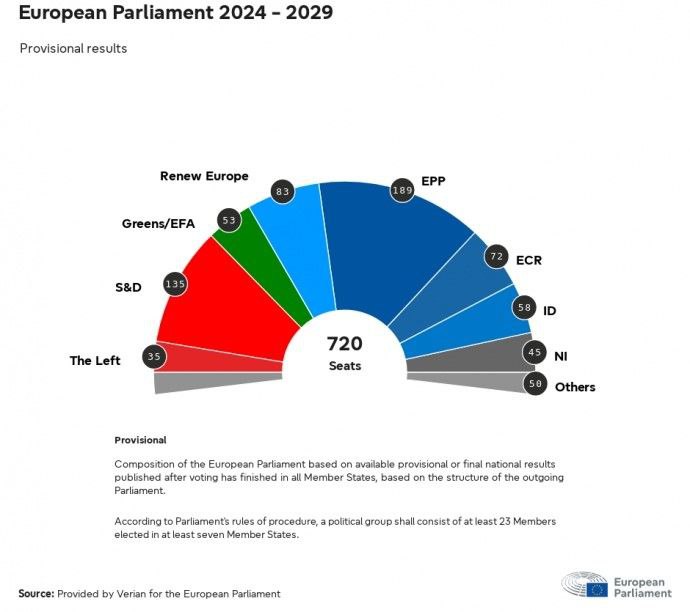European elections: a chance for Ukraine

Last weekend, elections to the European Parliament were held in all the states of the European Union. But not only the citizens of the united Europe eagerly awaited the voting results, the election campaign was also watched with great expectations in Kyiv and Moscow. After all, the amount of financial and military aid to Ukraine in its unequal struggle with the Russian Federation largely depends on the results of the vote.
The main intrigue was whether the European Parliament would maintain a pro-Ukrainian course, because the parties that won the most votes would claim leadership positions in the European Commission, the European Council, the European Parliament, and the EU’s foreign policy department – bodies that are re-elected after the elections to the European Parliament.
As expected, according to the voting results, there was a noticeable shift to the right as a result of Eurosceptics, right-wing radicals and populists entering the European Parliament. However, it seems that radical changes in the policy of the European Union are not foreseen.
The number of deputies to the European Parliament from each member state is represented in proportion to their population. The largest number of representatives came from Germany – 96, France – 81, Italy – 76. And it was the result in these countries that caused the greatest interest.
Germany
Chancellor Olaf Scholz’s centre-left party lost, as expected, with 14.1% and 14 seats. This is the worst result of the Social Democrats since the Second World War. The winner was the pro-Ukrainian Christian Democratic Union, whose member is Ursula von der Leyen, winning 30.3% of the vote (29 seats).
The head of the European Commission, Ursula von der Leyen, after announcing the preliminary results of the EP elections, said that the European People’s Party, which won the elections to the European Parliament, will build a strong “center” in it, which will have a clear pro-European and pro-Ukrainian position.
“I thank the voters for their trust. Today is a good day for the European People’s Party. We won the European elections. At this time, we are the strongest party and the basis for stability. I am grateful to the voters who have recognized our leadership over the past five years,” – she noted.
The second place of the pro-Russian Alternative for Germany (AfD), which won 15.6% and 15 seats, is a cause for concern.
France
Chancellor Scholz’s disappointing fate was echoed by French President Emmanuel Macron. His Renaissance party, with 14.5%, won only 13 seats, losing to far-right Marine Le Pen.
Thus, the National Association received 31.5% of the votes and 30 seats in the European Parliament. Le Pen was previously seen, like most Eurosceptics and nationalists, in close ties with the Kremlin. However, after the Russian invasion, it moved away from Moscow. Marine Le Pen even applauded in honor of Volodymyr Zelensky during his speech in the French parliament.
Macron was so shocked by the defeat of his party that he announced new elections for the National Assembly on June 30.
Italy
In Italy, the “Brothers of Italy” party of Prime Minister Giorgi Maloni won the elections in that country and will even more than double the number of seats in the European Parliament with a result of 28.6%, corresponding to 24 seats. This will give it new powers to influence politics in the EU.
Hungary
Longtime pro-Russian Prime Minister Viktor Orban won the election with his Fidesz party, receiving 44% of the vote (10 seats). However, this is significantly less than expected and is the worst result in the last two decades.
Slovakia
Another Moscow sympathizer, Robert Fitso, who suffered an assassination attempt a few weeks ago, could not get the first result. His party won 24.8% and 5 seats. And the pro-European and pro-Ukrainian liberal party won (27.8% and 6 seats).
Victory of the People’s Party
After summarizing the results of the elections, it becomes clear that pro-Ukrainian forces will once again prevail in the main representative body of Europe.
Seats in the European Parliament of the new convocation will be distributed as follows:
- European People’s Party (EPP) – 189
- Socialists and Democrats (S&D) – 135
- Renewal of Europe (Renew Europe) – 83
- European Conservatives and Reformists (ECR) – 72
- Identity and Democracy (ID) – 58
- Greens – 53
- The Left – 35
- Unaffiliated candidates – 45
- Others – 50

The European People’s Party won in Germany, Spain, Poland, Bulgaria, Slovenia, Luxembourg, Cyprus, Latvia, Estonia, Finland, Croatia and Greece.
They also took six places in the Netherlands, beating expectations.
Ursula von der Leyen said in Brussels after announcing the preliminary results of the European Parliament elections to the members of the European People’s Party, writes Politico, that her political force will be an “anchor of stability.”
“I have always said that I want to create a broad majority for a strong Europe. In my first mandate, I demonstrated what a strong Europe can achieve. My goal is to continue this path with those who are pro-European, pro-Ukrainian, pro-rule of law, and from tomorrow This work begins again. Today is a good day for the European People’s Party. We are the strongest party for the time being. I am grateful to the voters who have recognized our leadership for the past five years years”, – she noted.
The elections to the European Parliament have become encouraging for Ukraine. Our state can continue to count on the political, financial and military support of Europe. However, trends towards Euroscepticism and populism are growing, so we should not miss our chance.
Oleksandr Lysenko





